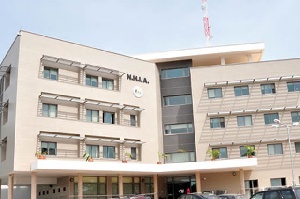 The National Health Insurance Authority premise
The National Health Insurance Authority premise
As the Ministry of Health (MOH) increased prices on the medicines of the National Health Insurance Authority (NHIA) which took effect on September 20, 2018, the authority has said that it has no knowledge of the increment.
The Communications Manager of the NHIA, Barima Sarpong, in an interview said that the authority was not aware of any increment in tariffs.
Mr Sarpong said the tariffs for 2018 had been signed off by the Ministry of Health and therefore could only be reviewed by at the end of the year.
“If there is an increment as you are speaking about, it must come from the Ministry of Health. The existing tariffs can only be reviewed at the year end. Per the law, you can only review annually,” he said.
However, the distribution list of the memo had the NHIS Chief Executive on it.
Currently, 517 medicines on the NHIS list are on the health system’s essential medicines list.
Mr Sarpong said while essential tariffs might have been increased, those of the NHIS could only be reviewed in 2019.
Eight Percent Increment
Additionally, there is an eight per cent increment in the offer price of all medicines supplied under the Framework Contract Agreement (FCA), with effect from July 1.
Framework contracts are long-term agreements that provide the terms and conditions under which smaller repeat purchasing orders may be issued for a defined period of time.
Known sometimes as “Blanket Purchase Agreement”, it establishes the general terms governing contracts to be awarded during a given period, in particular with regard to price and, where appropriate, the quantity envisaged.
According to the MoH, the method saved time and money, had a faster processing time and reduced paperwork because prices and terms were settled in advance.
Memo
A copy of a memo signed by a Deputy Minister of Health, Mr Kingsley Aboagye-Gyedu, announcing the increment and obtained by the Daily Graphic stated that the decision was in line with “the government’s policy of making other health technologies affordable and accessible to all people living in Ghana, as well as its commitment to the growth of the local pharmaceutical industry”.
“The prices of medicines to be adjusted on the NHIA list are those for which the tender price has gone beyond the current prevailing NHIA price after the recommended mark up of 25 per cent and upward of eight per cent has been applied,” it stated.
The memo noted that following several stakeholder engagements after the identification of challenges emerging from the implementation of the FCA and the Value Added Tax (VAT) exemption policy, the ministry, after consideration of a request by its suppliers under the agreement, decided to adjust the prices, in consultation with its stakeholders.
The Chief Executive Officer of the Chamber of Pharmacy, Ghana, Mr Anthony Amakah, told the Daily Graphic that while the increment was welcomed for the industry because it would keep the supply chain in business, the chamber was concerned about inflation, the cedi depreciation against the dollar and the imposition of the 2.5 per cent GETFund and NHIS Levy on medicines.
30 per cent drop
The MoH, in May this year, signed a memorandum of understanding with some 16 selected pharmaceutical companies for the implementation of the scrapping of VAT on some essential medicines in Ghana.
With the signing of FCA with suppliers, the prices of medicines were to reduce by 30 per cent.
Mr Amakah said although prices were supposed to have dropped by 30 per cent because of the scrapping of VAT on medicines, the decision might not yield the needed result because the NHIA still owed service providers 11 months.
He said the agreement reached with the ministry was that for the price reduction to be effective, the funds should be released to service providers within three months, but that had not happened.
“Suppliers are given only 90 days grace period to pay for consignments. Our people have to go and borrow at 28 per cent to prevent being blacklisted by their suppliers. If the NHIA is able to pay promptly, things may improve,” he said.
Mr Amakah said as it was now, the cost would be shifted to the consumer or the government.
He also made a strong case against the imposition of the 2.5 per cent NHIS/GETFund levy on medicines, saying it was part of the reason the prices of medicines would rise.
Some industry players, however, fear the increases could go to compound the problems of an already overburdened NHIA.